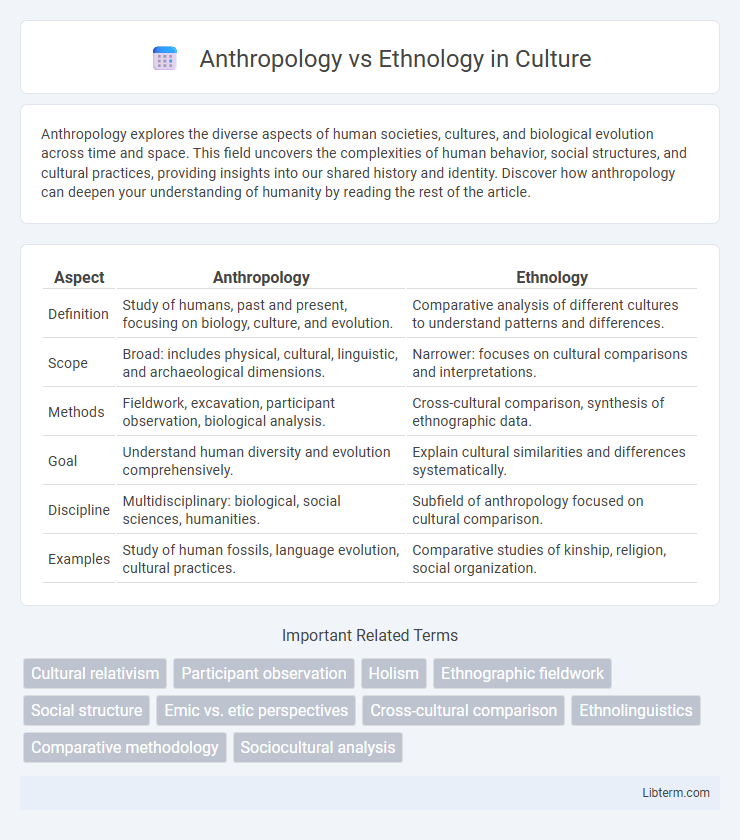Anthropology explores the diverse aspects of human societies, cultures, and biological evolution across time and space. This field uncovers the complexities of human behavior, social structures, and cultural practices, providing insights into our shared history and identity. Discover how anthropology can deepen your understanding of humanity by reading the rest of the article.
Table of Comparison
| Aspect | Anthropology | Ethnology |
|---|---|---|
| Definition | Study of humans, past and present, focusing on biology, culture, and evolution. | Comparative analysis of different cultures to understand patterns and differences. |
| Scope | Broad: includes physical, cultural, linguistic, and archaeological dimensions. | Narrower: focuses on cultural comparisons and interpretations. |
| Methods | Fieldwork, excavation, participant observation, biological analysis. | Cross-cultural comparison, synthesis of ethnographic data. |
| Goal | Understand human diversity and evolution comprehensively. | Explain cultural similarities and differences systematically. |
| Discipline | Multidisciplinary: biological, social sciences, humanities. | Subfield of anthropology focused on cultural comparison. |
| Examples | Study of human fossils, language evolution, cultural practices. | Comparative studies of kinship, religion, social organization. |
Defining Anthropology: A Broad Overview
Anthropology is the comprehensive study of human beings, encompassing biological, cultural, linguistic, and archaeological perspectives to understand human evolution, behavior, and societies. It integrates data from fossil records, genetic analysis, social customs, and language patterns to explore both past and contemporary human life. This interdisciplinary approach distinguishes anthropology from ethnology, which specifically analyzes and compares cultural characteristics within and across societies.
Understanding Ethnology: Scope and Focus
Ethnology is a branch of anthropology that systematically compares and analyzes different cultures to understand their social structures, customs, and beliefs. Its scope includes examining patterns such as kinship, religion, and economic systems across societies to identify cultural similarities and differences. By focusing on cross-cultural comparisons, ethnology provides insights into the diversity and commonality of human experiences worldwide.
Historical Origins of Anthropology and Ethnology
Anthropology originated in the 19th century as a broad scientific study of human societies, cultures, and biological aspects, emerging from European colonial exploration and evolutionary theory. Ethnology, a subfield of anthropology, developed simultaneously as a more comparative analysis of cultures, focusing on examining and contrasting customs, social structures, and patterns across different ethnic groups. The historical separation highlights anthropology's holistic approach, while ethnology hones in on cross-cultural comparisons to understand human diversity.
Methodological Differences Between Anthropology and Ethnology
Anthropology employs a holistic approach, integrating biological, archaeological, linguistic, and cultural methods to study humans across time and space, while ethnology specifically focuses on comparative analysis of living cultures using systematic fieldwork and participant observation. Anthropologists often use interdisciplinary data collection, including fossil records and genetics, whereas ethnologists prioritize qualitative methods such as interviews and ethnographic surveys to interpret social behaviors. The methodological difference lies in anthropology's broad synthesis of diverse data versus ethnology's concentrated, comparative study of cultural phenomena.
Key Theoretical Frameworks in Anthropology
Anthropology encompasses diverse theoretical frameworks such as cultural relativism, structural functionalism, and symbolic interactionism to analyze human societies holistically. Ethnology, a subfield of anthropology, applies comparative methods grounded in these frameworks to study and contrast cultures systematically. Emphasizing cross-cultural analysis, ethnology draws heavily on participant observation and fieldwork insights derived from broader anthropological theories.
Ethnology’s Comparative Approach
Ethnology examines and compares the cultural practices, social structures, and beliefs of different societies to identify patterns and differences. This comparative approach enables researchers to develop theories about human behavior and cultural universals, enhancing the understanding of cultural diversity. Unlike anthropology, which studies humans broadly through biological and archaeological perspectives, ethnology specifically focuses on analyzing cultural data gathered from ethnographic research.
Fieldwork and Data Collection Techniques
Anthropology employs diverse fieldwork methods such as participant observation, interviews, and archaeological excavation to gather qualitative and quantitative data on human cultures and biological aspects. Ethnology specifically centers on comparative fieldwork, utilizing systematic data collection techniques like structured interviews, surveys, and audio-visual recordings to analyze cultural patterns across societies. Both disciplines rely heavily on immersive fieldwork but differ in scope, with anthropology encompassing broader human studies and ethnology focusing on cross-cultural comparisons.
Interdisciplinary Connections and Overlaps
Anthropology and ethnology intersect through their shared focus on studying human cultures, behaviors, and societies, drawing from disciplines like sociology, history, linguistics, and archaeology to provide comprehensive cultural analyses. Ethnology, a subfield of cultural anthropology, emphasizes comparative studies across societies, utilizing interdisciplinary methods to identify patterns and variations in customs, social structures, and belief systems. Both fields leverage insights from psychology and biology to deepen understanding of human diversity and cultural evolution, highlighting their integrative approach within the social sciences.
Practical Applications in Contemporary Society
Anthropology provides comprehensive insights into human behavior, biology, and cultural development, essential for fields like public health, urban planning, and education by informing culturally sensitive policies and interventions. Ethnology, emphasizing comparative analysis of cultures, aids in conflict resolution, international business, and multicultural marketing by fostering cross-cultural understanding and communication. Both disciplines contribute to preserving cultural heritage and promoting social justice through applied research in contemporary societal challenges.
Future Directions for Anthropology and Ethnology
Future directions for anthropology and ethnology emphasize integrating digital technologies and big data analytics to deepen cultural understanding and human behavior analysis. Interdisciplinary collaboration with fields such as genetics, environmental science, and artificial intelligence will enhance the study of human evolution, adaptation, and cultural diversity. Ethical considerations and inclusive methodologies will become central, promoting decolonized research practices and amplifying indigenous and marginalized voices in anthropological and ethnological studies.
Anthropology Infographic

 libterm.com
libterm.com